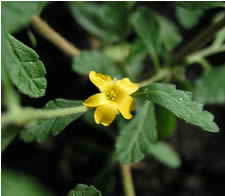|
|
|
|
| Common Names : |
| Actions: stimulant, increases blood flow, increases sexual sensitivity |
| Medicinal Uses:depression, anxiety, exhaustion, digestive complaints, and water retention |
| Parts Used: Leaves |
| Constituents:Leaves: greenish volatile oil consisting of cineole, p-cymene, alpha- and beta-pinene, thymol, alpha-copaene, and calamene. The dry matter of the leaf includes damianin as well as tannins, flavonoids, beta-sitosterol, and the glycosides gonzalitosin, arbu |
|

Damiana is a small shrub native to Mexico, South America, and Texas, and is used primarily as an aphrodisiac for both sexes. It has a long history of use in folk medicine, for thousands of years, Latin American cultures have ritualistically used Damiana as a sexual stimulant. In Mexico it was first used primarily by women, who drank damiana tea prior to lovemaking. The Mayans and Aztecs used it as a sexual stimulant and as a treatment for respiratory disorders. Damiana was sometimes burned ceremoniously to enable participants to "see visions".
Damiana has a basis as a treatment for low libido, premature ejaculation, and impotence in both folklore and modern science. The alkaloids in Damiana leaf are stimulating, help increase blood flow, and have anecdotal reports of increasing sexual sensitivity and euphoria. (1) Chemical analysis shows that damiana contains alkaloids similar to caffeine that have stimulating and aphrodisiac effects, stimulating blood flow to the genital area and increasing sensitivity. Some people report feelings of mild euphoria.
|
|
Preparation Methods :Liquid extracts, encapsulated powder,and most often teas. The tea is bitter, and is often blended with other herbs. Damiana is often combined with saw palmetto in formulas that address male prostate health
|
|
 Buy Bulk Organic Damiana Buy Bulk Organic Damiana
|
| Side Effects: |
|---|
| Damiana should be avoided in pregnancy. |
| |
- Nancy L Nickell Nature's Aphrodisiacs (1999)
|
|
|
|
|
|